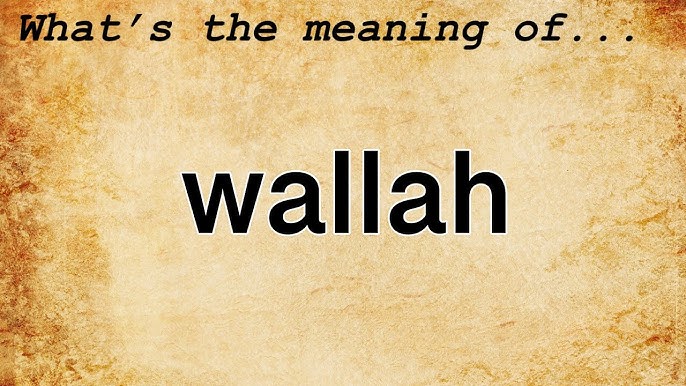Wallahi Meaning
Table of Contents
ToggleThe term “Wallahi” is an Arabic expression that adds solemnity and emphasis to one’s speech, conveying a sense of truthfulness and sincerity. This phrase is commonly used by Arabic speakers to assert the veracity of a statement or to make a solemn promise.
Key Takeaways
- Wallahi is an Arabic expression that adds emphasis and sincerity to a statement.
- It translates to “by God” or “I swear by God” and is used to assert the truthfulness of a claim.
- The phrase is commonly used in Arabic-speaking communities to make a solemn promise or to emphasize the veracity of a statement.
- Wallahi carries significant cultural and religious connotations in its original Arabic context.
- Understanding the meaning and usage of Wallahi can help non-Arabic speakers better comprehend its nuanced usage in Arabic discourse.
what does wallahi mean
The Arabic phrase “Wallahi” is a compound of two words: “wa,” which means “by” or “and,” and “Allah,” which refers to the name of God in the Islamic faith. When combined, the term “Wallahi” translates to “by God” or “I swear by God.” This expression is commonly used by Arabic speakers to add emphasis and solemnity to their statements, conveying a sense of truthfulness and sincerity.
The meaning of Wallahi goes beyond a simple English translation, as it carries significant cultural and religious connotations within the context of the Arabic language. The Wallahi translation can be understood as an oath or a solemn promise, where the speaker invokes the name of God to affirm the veracity of their words.
When used in conversation, the Wallahi Arabic meaning serves to underscore the speaker’s commitment to the truthfulness of their statement. It is a way of emphasizing the gravity and importance of the matter at hand, ultimately reinforcing the Wallahi definition and Wallahi usage as a means of conveying authenticity and trustworthiness.
| Keyword | Explanation |
|---|---|
| Meaning of Wallahi | The phrase “Wallahi” translates to “by God” or “I swear by God” in English. |
| Wallahi translation | The English equivalent of the Arabic phrase “Wallahi” is “by God” or “I swear by God.” |
| Wallahi Arabic meaning | In the original Arabic context, “Wallahi” carries significant cultural and religious connotations, serving as an oath or solemn promise. |
| Wallahi definition | The definition of “Wallahi” is an Arabic expression that adds emphasis and solemnity to a statement, conveying truthfulness and sincerity. |
| Wallahi usage | Arabic speakers commonly use the phrase “Wallahi” to underscore the gravity and importance of their words, reinforcing the authenticity of their statements. |
By understanding the meaning of Wallahi, its Wallahi translation, and the deeper Wallahi Arabic meaning, we can gain insight into the cultural and linguistic nuances that shape the Wallahi definition and Wallahi usage within the Arabic-speaking world.

Wallahi Arabic Meaning
The Arabic phrase “Wallahi” has a deep and nuanced meaning that goes beyond a simple English translation. In its original Arabic context, “Wallahi” carries significant cultural and religious connotations. The word is a compound of two Arabic terms: “Wa,” which means “by” or “and,” and “Allah,” which refers to the Islamic deity.
What Does Wallahi Mean in English?
When combined, the phrase “Wallahi” translates to “by God” or “I swear by God.” This expression is commonly used by Arabic speakers to add solemnity and emphasis to their speech, conveying a sense of truthfulness and sincerity. Individuals often invoke “Wallahi” to assert the veracity of a statement or to make a solemn promise.
What Does Wallahi Mean in Arabic?
In the Arabic, the phrase “Wallahi” “والله” holds deep religious significance. By invoking the name of Allah, the speaker is not only emphasizing the truthfulness of their words but also making a sacred oath. The usage of “wallahi” is deeply rooted in the principles of Islamic faith, where swearing by the name of God is considered a weighty and serious matter.
FAQ
What is the meaning of “Wallahi”?
“Wallahi” is an Arabic expression that adds solemnity and emphasis to one’s speech, conveying a sense of truthfulness and sincerity. This phrase is commonly used by Arabic speakers to assert the veracity of a statement or to make a solemn promise.
What does “Wallahi” mean in English?
The word “Wallahi” is a compound of two Arabic words: “wa,” which means “by” or “and,” and “Allah,” which means “God.” When combined, the phrase “wallahi” translates to “by God” or “I swear by God.”
What is the Arabic meaning of “wallahi”?
In its original Arabic context, “Wallahi” carries significant cultural and religious connotations. The phrase “Wallahi” has a deep and nuanced meaning that goes beyond a simple English translation, reflecting the importance of faith and truthfulness in Arabic-speaking communities.
How is “Wallahi” used in everyday conversation?
“Wallahi” is commonly used by Arabic speakers to emphasize the truthfulness of a statement, to make a solemn promise, or to express strong conviction. It is often used to add weight and credibility to one’s words, underscoring the importance of honesty and sincerity in communication.
What is the cultural and religious significance of “Wallahi”?
The phrase “Wallahi” holds deep cultural and religious significance for Arabic-speaking communities. It reflects the central role of faith and the belief in God (Allah) in daily life, as well as the importance of truthfulness and integrity in interpersonal relationships and social interactions.


























